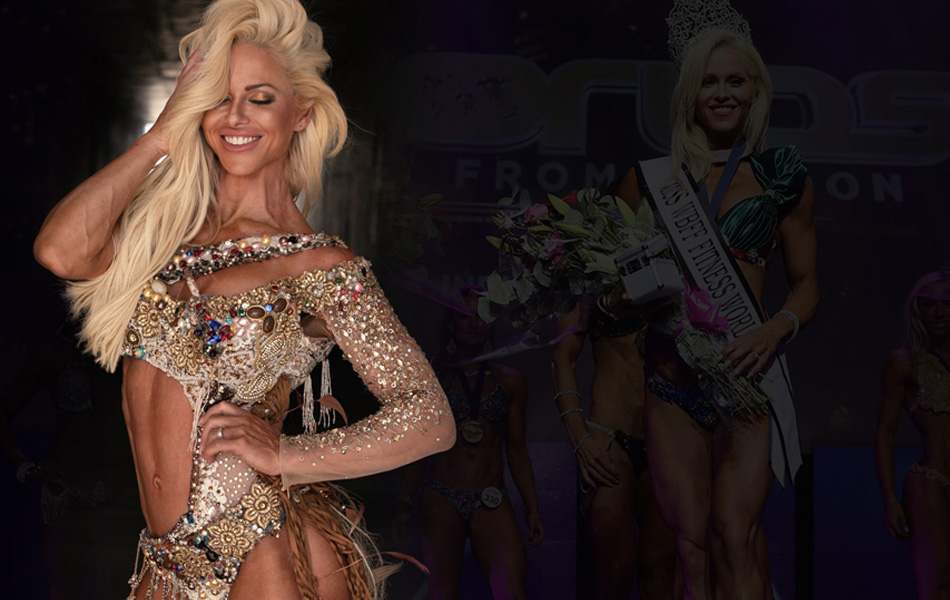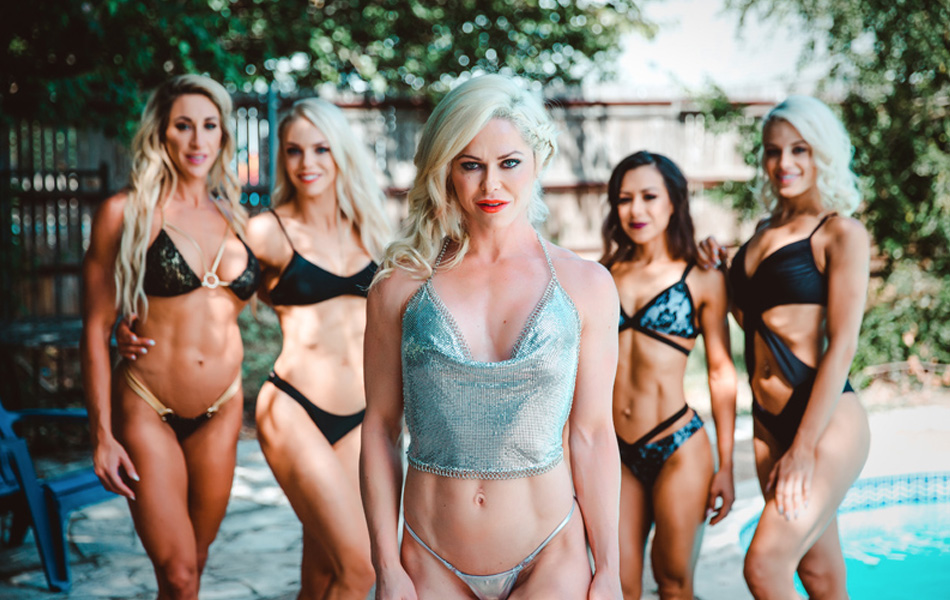Competition Prep Process

Do you want to get on stage as a competitor and be in the best shape of your life?
If you’re already competing or just aspiring to step on stage for the first time, you’re probably trying to reach that perfect balance of being in great shape, looking stunning on and off stage, and actually enjoying the process while staying healthy.
Let me first say, I have amazing respect for anyone who has the commitment to compete in a fitness competition, be it bikini or bodybuilding.
I know how tough the process is and that’s why today I want to share with you my tips and tactics so you can avoid all these mistakes other women in the industry make.
When you decide you’re going to be in a competition, the first and most essential thing is making a commitment that you’re going to go through with it to the end.
So, you want to compete as a female fitness or bikini competitor?
Sometimes you can already be in shape when you decide you’re going to do a competition.
The fact is this – knowing where you’re at now can help you manage your expectations and set clear goals.
We’ll talk about diet and training further, but for now we’ll emphasize how important it is to take your time with this and be patient.
Unless you stay lean year-round, what will work best for you is slow and steady dieting first, then the competition prep.
Always be aware of the competitions you want to do, but don’t lock anything in.
When you’re closer to the needed stage shape you can easily choose a date, make a plan, and work on the specific things you need in order to reach first place.
If you’re in shape and you’re just wondering about it, but you have a strong work ethic and like new experiences – definitely go for it.
After you decide what show you want to do, all you have to do is see what the requirements are. Every organization can have different ways of judging and criteria. Submit your form, take any drug tests, put together your posing routines and let’s do this!
Pre-competition Diet
Being 12 weeks out from a show is a wonderful feeling.
First things first, if you’re not an expert on diet and nutrition, this is the point where you can hire someone to help you with this. Most people assume you already know everything if you’re someone who competes in a lot of shows.
That simply not true! It’s okay to seek help from experts and trainers on whatever area you might be lacking.
So, the 12 week point is when you eliminate all junk food from your diet. Focus on drinking more water, and eating a lot of meals each consisting of some form of protein, carbs, and a little fat. Make sure to track every calorie you take in and tailor your daily plans around that. Limit all sugary foods, candy and desserts to a minimum.
A question I get asked a lot is… what about carbs? It’s different for everyone really!
Do you tend to store fat easily? Are you sensitive to carbohydrates? If you are, keep your carbs similar or equal to your protein.
Do you tend to stay skinny? If you have a fast metabolism and it’s hard for you to gain a lot of weight, add some carbs to your diet but keep the protein high.
Make a plan for yourself based on your characteristics, and if you follow the first week perfectly, you’ll have no problem going through to the end, I promise!
By being consistent with your intake, you can figure out what you need more (and less) of. Listen to your body. Not having enough energy means you need more calories.
Manage your macronutrient ratio. Even though low carb diets are popular among women, but it’s not a good strategy here. The contest prep is a lot easier and predictable when you’re taking in carbs. The only downside – your hunger and energy levels will vary, but you’ll still be leaner in the end.
For protein, don’t set it higher than 1.3g/lbs of bodyweight and start with 1g/lbs while carbs and calories are still high. Too much protein (1.5g/lbs+) leads to poorer digestion and more water retention/bloating.
For calories, the average is 14-17x your bodyweight depending on your frame and activity level.
We won’t go into food choices in detail, but this is what you should be eating for the most part: meat like fish and chicken, eggs, low-fat dairy, potatoes, sweet potatoes, rice and oatmeal.
These foods will be the most convenient and delicious options when you’re prepping for a contest.
To get an idea of how to balance calories, you won’t really be dropping calories for more than 150-200kcals per week, more like 100kcals. It depends how much cardio you’re doing, but make sure you’re adding training instead of removing food next time you feel like you need an adjustment.
Pre-competition Training & Cardio
Okay, so your diet is on point now, you go in the gym and you’re ready to build that dream body!
See, a lot of new competitors get lied to. They’re being told that in order to get leaned out, you need to increase reps and decrease weight – for a fat-burning workout.
This will indeed increase your heart rate and get you to burn calories, but a lot of your hard-earned muscle will go away with it. When your goal is to lean out and keep your muscle, that’s not a good way to go.
Training should be the same. Continue using your routine, it doesn’t matter what split or range it is. Keep the weights as heavy as you can through your prep period. Keep in mind it can be difficult doing that when your energy levels and strength drop on a caloric deficit.
The proper route is increasing the intensity. Any type of workout can become a high-intensity workout. Decrease rest periods, negatives, do super-sets, drop-sets, and you’re good.
Your heart rate should really go up, you should be sweating, and your muscle will definitely be burning!
In terms of your overall training strategy, many factors come into the equation of the best training plan will be for you.
Too many of us would rather do more, in the effort of quicker results. This doesn’t work effectively and it will devastating long-term for you, as your body is a very intricate system of other smaller systems.
You rock up to the gym and know exactly how you have to train and what you need to eat and do to get the most out of your body.
Making it so much easier to just follow through and get the job done, especially when you know what your weak points are and you can work on them.
A big part of your will most likely be cardio.
Cardio… is only sometimes a must. It’s often time done WAY too early, and too often. This is something that you should avoid at all costs as it will give your body the stimulus it needs to change without overdoing it.
Also, you need to understand whether you respond better to High-Intensity Interval Training (HIIT) or slow, long stretches of cardio for fat loss. The right adjustments will help you get better results.
Unless you have tried it out you won’t know.
If you are doing cardio, without knowing your training history, I can only give you points of reference you can test for yourself and see how you feel.
You can start with 3 30-minute sessions a week and move from there.
If you’re dropping your calories but not losing fat, or you feel like your cardio isn’t enough, feel free to add a few minutes every session! But if you’re maintaining a balanced progress while only doing those 3 30-minute sessions, you’re good to go!
Keep your cardio to sprint intervals, tempo intervals, and long duration moderate intensity sessions!
You can progress from 3 cardio sessions per week all the way up to a maximum of 4-6 if you feel like it’s necessary.
It’s really important to watch out for the intensity and overtraining – especially on a caloric deficit.
A word on hiring coaches…
It’s really a big help to have someone look from the outside in and give you honest feedback.
Here’s the thing, if you’re hiring a coach…
…Pick one coach, and listen ONLY to their advice.
Once you have the right training plan and you’re following through with your diet, you should have no problem going on that stage, being your best self, and rocking it!

Post Competition
It doesn’t matter if you won or not, it’s an amazing learning experience.
Let me just tell you first, post-competition diets are a thing.
You don’t want to look great on comp day, have an incredible time, and then happily binge cheat meals…
Rapid fat and weight gain post comp is something you must avoid.
Firstly, realize that the race isn’t over once you walk off stage.
Your body can very quickly gain fat, and this is especially true when you have prepped incorrectly and your bodies systems and the hormonal environment is screaming for help.
Post comp rebound is common, but it doesn’t have to happen for you. And this is where the term ‘reverse diet’ comes in.
Slowly adding back more food into your diet and taking away exercise will leave you with a highly functioning metabolism, happy hormone levels, and great look.
All of this information might be a little overwhelming.
And I know… competing for the first time can be scary, but it is well worth it.
Stick to the plan, stay motivated and don’t be afraid to lean on others when you are struggling.
You will make a lot of mistakes the first time but don’t beat yourself up, learn from them and be better the next time.
And most importantly, don’t forget to enjoy yourself and be proud of all that you have accomplished.
Good luck and happy competing!





